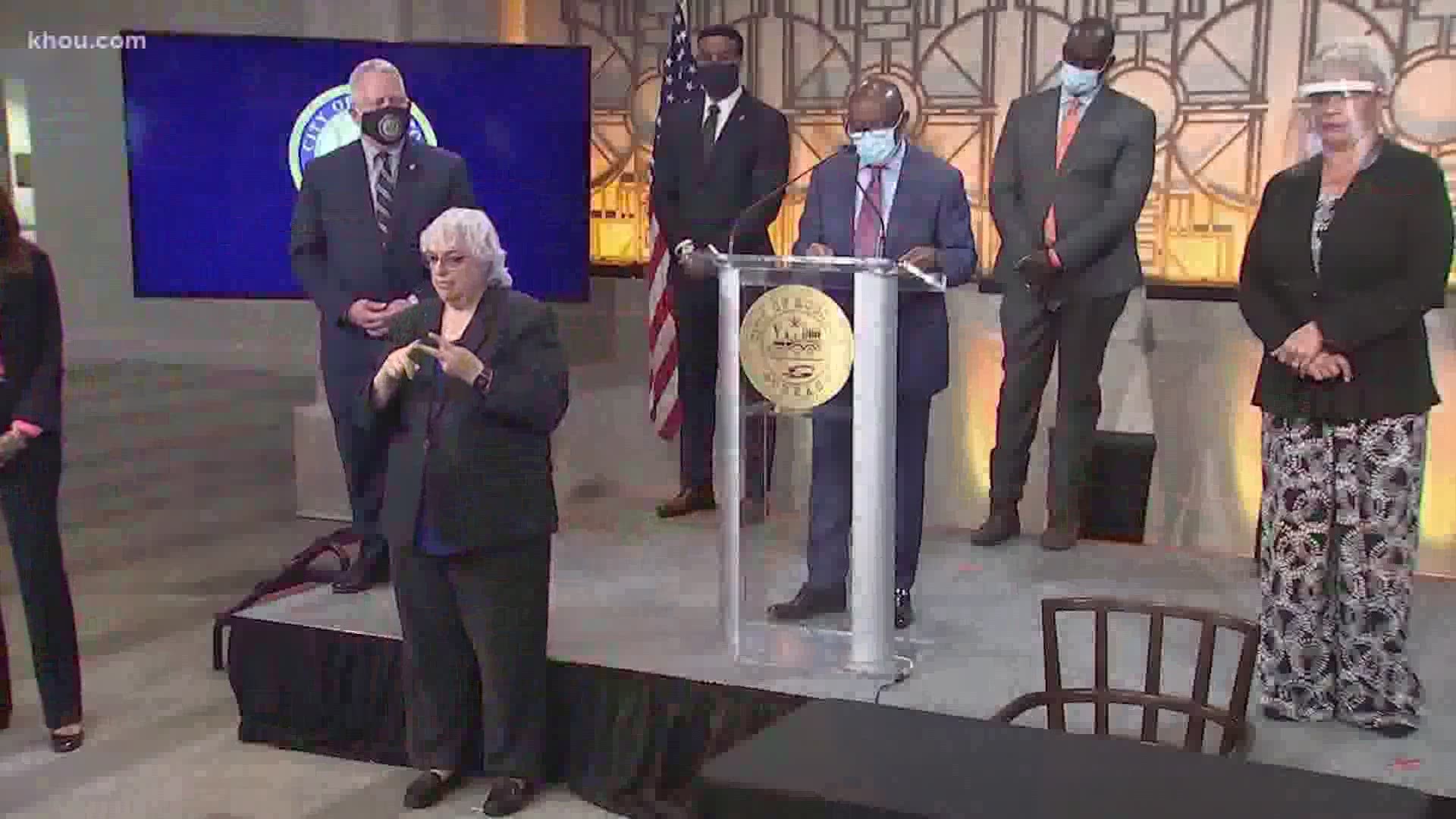HOUSTON — Houston’s mayor signed an executive order Wednesday laying out several police reform measures.
Those include the eight policies on the trending #8CantWait social media campaign aiming to reduce police violence following George Floyd’s death.
Mayor Sylvester Turner signed Executive Order 10-67 just after 5 p.m. Wednesday at City Hall. It came after he received a letter the previous week from several African-American members urging him to do so.
The order bans chokeholds, strangleholds and officers putting a knee on a suspect’s neck.
It also requires deescalation, only using the amount of force required, and exhausting all reasonable alternatives before using deadly force, including verbal warnings when possible.
All cases of deadly force must now be reported to independent police oversight board. If officers see colleagues using excessive force, they must intervene and report the incident to a supervisor.
Officers cannot shoot at a moving vehicle unless they’re protecting themselves or someone else from serious injury or death.
The order also bans no-knock warrants without the chief’s approval and requires body camera usage for all entry and perimeter teams.
“This is not the end,” Mayor Turner said. “This is just a step in moving forward. We still need to hear from, we want to hear from people in all of these City Council districts and throughout the city of Houston.”
The mayor thanked protesters around the world for urging action on the issue.
Chief Art Acevedo called the signing of the order “a huge watershed moment” because it codifies the policies, many of which HPD officials say were already in practice.
“I served in Austin for nine-and-a-half years,” said Chief Art Acevedo. “I put things in place, and some of those things after I left were changed.”
Chief Acevedo said the policies covered by this executive order will be harder to change.
“(These rules) cannot be changed by a future chief without coming through the mayor’s office, cannot be changed in the dark, cannot be changed overnight,” said Chief Acevedo. “It has to come back to this mayor, or the next mayor, or ten mayors from now. It requires action that will be public, and the document will be filed for everyone to see.”
Some of the mayor’s guidance in the executive order is already practiced by officers, according to Chief Acevedo.
The order states officers should attempt to deescalate the situation before using force, officers should make clear their intent prior to an arrest or a bodily search, and officers should identify him/herself before using force.
We asked criminal justice expert and Texas Southern University professor Dr. Howard Henderson, Ph.D., if these are actual changes to existing procedure.
“So on one hand, what the mayor has done is saying, ‘Hey, listen, I’m noticing this, I’m taking note, and going forward, we’re going to be able to hold people more accountable because there’s been a public statement,’” Henderson said.
Henderson’s years of research on law enforcement and police brutality cases tell him a change will not happen overnight.
“We want to remain optimistic, but the reality of it is, we’re going to see case after case and it’s going to take lives before we perfect the system,” Henderson said.
Henderson said TSU’s recently assembled police reform advisory committee has data-driven recommendations that will likely lead to lasting change within police organization.
One of the recommendations is more thorough psychological examinations of candidates before they join the force.
“We want to be able to identify these individuals on the front end so they don’t wind up in the community murdering individuals for no reason,” Henderson said.
He said educational requirements for future officers should also be addressed.
“We know there is a direct correlation between an officer’s educational level and the likelihood they will be involved in these use-of-force cases,” Henderson said.
Henderson says HPD’s post-high-school education requirement was reduced to half of what it once was.
“It used to be two years, with an associate’s degree,” Henderson said. “It seems like we’re going the other way. You’d think that in 2020 we’d be going higher because a police officer has the ability to take life.”
Henderson said one of the most effective things officers can do right now to build trust among the community is to become more a part of it.
He said research shows engaging with residents on unofficial terms helps to build a foundation for trust and less animosity.

